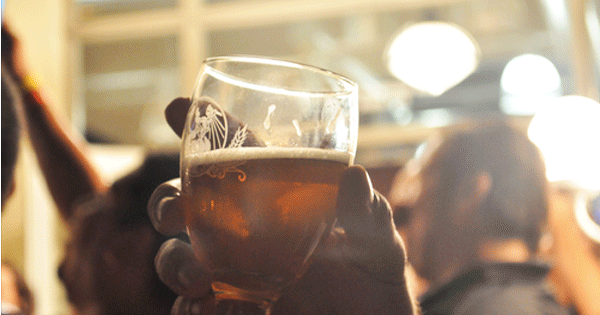Advertisement
Scientists have finally settled the age-old debate of wine versus beer--and beer has won.
"Though it's been blamed for many a paunch, it's more nutritious than most other alcoholic drinks," Charlie Bamforth, a professor of brewing sciences at the University of California, Davis tells NPR. "There's a reason people call it liquid bread."
Beer has more selenium, B vitamins, phosphorus, folate and niacin than wine, as well as more fiber and protein. It is also one of a few significant dietary sources of silicon, which research has shown can help thwart the effects of osteoporosis.
While both beer and wine contain antioxidants, beer contains more prebiotics--nourishment for the good bacteria in your gut.
Red wine has long been held has heart-healthy and celebrated for it's dose of resveratrol, a compound which is seen as a nutritional key to longevity.
"The way that the wine industry advertised red wine [as healthy], making us think beer just causes beer bellies, was very clever," says Bamforth.
Bamforth explains, however, that our bodies more readily absorb the antioxidants in beer than in wine.
"With beer, more of [the antioxidants] actually get into the body," he says, "though beers can have varying levels of them."
Bamforth also says that it's a common misconception that the color of your beer reflects the beer's nutritional content. In other words, a pint of Guinness is about the same as a Budweiser lager. More than that, craft beer is not any healthier than mass-produced lagers, which tend to be made with "natural, grain-based sugars and few, if any, synthetic additives."
On the other hand, if you're more concerned with calories and watching your carbohydrate intake than you are with the nutritional value, wine is by far the better option.
NPR explains, "A standard 5-ounce glass of wine contains just 1 or 2 grams of carbohydrates. A 12-ounce serving of a 5 percent-alcohol beer has between 10 and 20 grams of carbs — or 40 to 80 extra calories." It's still important to note, however, that beer doesn't have as many carbohydrates as, say, bread.
Still, some people think no alcohol is better than any alcohol.
Arthur Klatsky, a retired Kaiser Permanente doctor and a researcher of the health effects of alcohol consumption, is one of those people. He does, however, agree that "beer has more nutrients, often more calories, [and] B vitamins. It's more like a food [than wine or spirits]."
Consistency is key, though. If you want to reap the heart-healthy benefits of drinking, an average man should consume two or three drinks per day, and one or two for the average woman. A drink, he notes, "is a 5-ounce serving of wine or a 12-ounce serving of 5 percent-alcohol beer."
Be warned, however, that it's easy to overdo it and damage the liver and, in some cases, cause fatal alcohol poisoning.
What do you think about this study? Does this mean you will switch to drinking beer? Let us know what you think in the comments!
Photo Copyright © 2014 Tumblr




